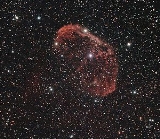
Crescent Nebula
Encyclopedia
The Crescent Nebula is an emission nebula
in the constellation Cygnus
, about 5000 light years away. It is formed by the fast stellar wind
from the Wolf-Rayet star
WR 136
(HD 192163) colliding with and energizing the slower moving wind ejected by the star when it became a red giant
around 400,000 years ago. The result of the collision is a shell and two shock wave
s, one moving outward and one moving inward. The inward moving shock wave heats the stellar wind to X-ray
-emitting temperatures.
Emission nebula
An emission nebula is a cloud of ionized gas emitting light of various colors. The most common source of ionization is high-energy photons emitted from a nearby hot star...
in the constellation Cygnus
Cygnus (constellation)
Cygnus is a northern constellation lying on the plane of the Milky Way. Its name is the Latinized Hellenic word for swan. One of the most recognizable constellations of the northern summer and autumn, it features a prominent asterism known as the Northern Cross...
, about 5000 light years away. It is formed by the fast stellar wind
Stellar wind
A stellar wind is a flow of neutral or charged gas ejected from the upper atmosphere of a star. It is distinguished from the bipolar outflows characteristic of young stars by being less collimated, although stellar winds are not generally spherically symmetric.Different types of stars have...
from the Wolf-Rayet star
Wolf-Rayet star
Wolf–Rayet stars are evolved, massive stars , which are losing mass rapidly by means of a very strong stellar wind, with speeds up to 2000 km/s...
WR 136
WR 136
WR 136, a Wolf–Rayet star.-References:* http://jumk.de/astronomie/big-stars/wr-136.shtml* http://www.springerlink.com/content/04205412121836v4/* http://chandra.harvard.edu/photo/2003/ngc6888/* http://www.giga-parsec.de/WRspectra.html...
(HD 192163) colliding with and energizing the slower moving wind ejected by the star when it became a red giant
Red giant
A red giant is a luminous giant star of low or intermediate mass in a late phase of stellar evolution. The outer atmosphere is inflated and tenuous, making the radius immense and the surface temperature low, somewhere from 5,000 K and lower...
around 400,000 years ago. The result of the collision is a shell and two shock wave
Shock wave
A shock wave is a type of propagating disturbance. Like an ordinary wave, it carries energy and can propagate through a medium or in some cases in the absence of a material medium, through a field such as the electromagnetic field...
s, one moving outward and one moving inward. The inward moving shock wave heats the stellar wind to X-ray
X-ray
X-radiation is a form of electromagnetic radiation. X-rays have a wavelength in the range of 0.01 to 10 nanometers, corresponding to frequencies in the range 30 petahertz to 30 exahertz and energies in the range 120 eV to 120 keV. They are shorter in wavelength than UV rays and longer than gamma...
-emitting temperatures.
Image Only
- Image by Daniel Lopez large image of whole nebula
Whole Nebula image with explanation
- APOD (2007-11-11) – NASA Astro Picture of the Day: Image by Franck Bugnet

